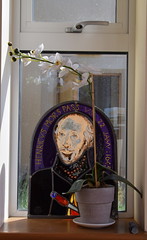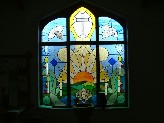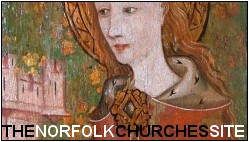| |
|
St Henry
Morse, Diss
 |
|
This
splendid Catholic church of 2012 on the
Shelfanger road was the replacement for the 1952 church of Holy Trinity down in
the town. Holy Trinity itself was a fairly
utilitarian conversion of a former bakery, and
had been enlarged for Diss's growing Catholic
population as recently as the turn of the 21st
Century, but it was clear something new was
needed. Diss had only become a Catholic parish in
1968, and the continuity of the church during the
penal years was maintained by local big houses
rather than in the town.
Henry Morse was a local lad. He was born at Brome
just over the Suffolk border in 1595 towards the
end of the Elizabethan period. At the age of 19
after the death of his father he went to France,
and was received into the Catholic Church at the
English seminary in Douai where his brother was
studying for the priesthood. Eventually ordained
himself, he served the faithful in Newcastle and
London. After a number of narrow scrapes he was
eventually arrested and charged with treason, and
of being the cause of treason in others. Taking
the vows of a Jesuit while imprisoned, he was
condemned to death by hanging, drawing and
quartering, the standard punishment for treason,
in 1645. The anti-Catholic fury of the
Elizabethan period had dissipated somewhat, and
at his martyrdom at Newgate Morse was mercifully
allowed to die on the scaffold. When his bowels
were wound out of him and his body cut into
quarters, the crowd surged forward to dip their
handkerchiefs in his blood. |
The new
church cost almost exactly a million pounds, funded by
the sale of the land on which the former church stood.
The style could be termed agricultural vernacular, and
the architects were Hollins of Framlingham. The structure
successfully combines a square worship space at the east
which can be extended into the hall to the west with a
flat for the resident priest, a nice medieval touch. The
overwhelming impression inside is of a church full of
gathered light.
| The
parish brought their font with them, but the
restored details of stained glass windows around
the sanctuary were from Stowmarket Catholic
church, in which parish this originally was. The
rood came from the Catholic chapel at RAF Marham,
and the altar from the Carmelite convent at
Langham. The modern abstract glass installed at
Holy Trinity barely a dozen years earlier was
also brought here, and forms a west window into
the parish hall. All in all, a church done
well, seemly and fitting for Catholic worship and
suitable for the life of the parish in the 21st
Century. It appears to be open every day.
|
|
 |
|
|
|
